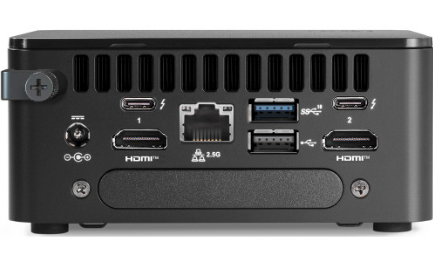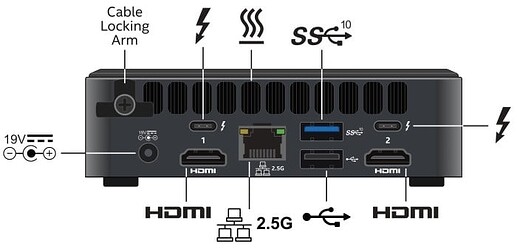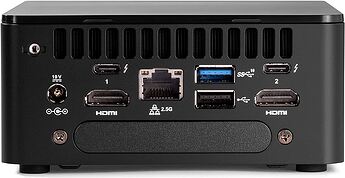Old news - ASUS has taken up the baton…
ROON NUCLEUS TITAN 's board can be a NUC 11, 12 or 13 series
Check yourself for each model’s back panel.
NUC11TNKV7 , NUC12WSHi7 , NUC13ANHi7
All looks the same.
Here are them:
NUC11TNKV7 ::
NUC12WSHi7::
NUC13ANHi7::

In addition to the hardware upgrades, which should be a significant performance and reliability improvement based on the advertisement, it would be beneficial for the OS to make use of multi cores and not be tied to performance of a single core. Seems to me that would offer a considerable performance enhancement across the board.
I thought ROCK already used all cores available, no?
If it doesn’t, a change to use all cores would benefit all implementations.
I’ve read over and over that the highest single core speed provides the best performance. Don’t know if that is the OS or server software where that comes into play. My NUC I7 has 2.8 single core speed and it still bogs down for one particular task, down sampling DSD 256 5.1 to PCM for playback to the HDMI AVR zone. I would not choose to do that but the followup radio feature does and the server platform should be able to handle anything the software decides to do.
Generally Roon uses one core per zone (the exception being DSD upsampling which can use 2 cores if you have the option turned on).
So I expect your DSD to PCM conversion isn’t benefiting from this. I can imagine 6 channels is a bit of a demanding task.
This sort of multi-core parallelisation is hard to code - so I wouldn’t expect to see this released in a Nucleus upgrade.
If you have a limited number of 5.1 DSD tracks - could you encode offline and make yourself a PCM version?
It is not unthinkable that the library used to transcode (DSD256 → PCM) is single core while ROCK is multicore. If this is the case there is nothing Roon can do to change that.
I very much doubt that Roon has coded transcoding libs. It is likely using something like SoX or some other open source library.
I can’t even imagine the size of DSD256 / 5.1 channel files!!!
I don’t know how roon do this - but given how important this is to them I expect the choice was very carefully made!
I expect the dual core delta sigma code took some effort to code (and probably fixes the most commonly seen roon dsp performance issue).
Might be worth raising this as a feature request - the product team might not even know it’s an issue.
I looked at some stats and see around 1.5 to 2 GB per track. The albums are huge depending on the number of tracks. I recall seeing one download being transferred and it was 28gb. I had to bump my storage from 2TB to 4TB when I started purchasing those.
I guess we know they use ffmpeg for some formats (because it’s needed on ROCK builds).
You can see their open source libraries here: Roon - OSS
Don’t know enough to guess about DSD to PCM encoding.
Even using a library that isn’t parallel it’s possible to split the job up across more than one thread - if there is a natural division - but it’s work. How hard depends on how much co-ordination is needed between the tasks.
I started purchasing DSD 256 5.1 albums after adding a DAC that could play native DSD files from Roon. Have a lot of those and the number increases as I find something I like.
Thats not a bad idea to make PCM versions but I still can control what Roon chooses for the Radio followup feature. Or if that is available I’m not aware of it.
And, the result always uses more compute resource in total than the single threaded version - which could itself have negative consequences in marginal situations.
As a somewhat contrived example (and ignoring the fact that you have to have some processor capacity in reserve to operate the UI): If a single zone with a particular set of DSP operations takes (at most) 98% of a single core of a 4-core processor (24.5% total processor utilisation), then 4 zones with those DSP operations could be supported - but, if after splitting the processing across 2 cores, it uses 52% of two cores (26% total processor utilisation), then only two such zones could be supported on the same 4-core processor.
Agree. I expect this why roon allow you to turn off the parallel DSD upsampling.
I would bet money that this is not something Roon did any work on, other than implement the already-built libraries in their code base. That is it. It would make zero sense for them to delve into transcoding, this is not something they know anything about, I don’t think.
This is the case, for any OS running RoonServer. Remember ROCK or the Nucleus is running a base RoonOS and then essentially the Linux RoonServer.
Assuming a 5-minute track:
44100 CD sampling rate x 256 x 6 channels x 5 min x 60 sec / 8 bits = 2.54GB
Thx. I didn’t mean I couldn’t calculate it… ![]() But living with those files sounds like a pain in the butt.
But living with those files sounds like a pain in the butt.
Totally agree. You can’t even compress them.
I haven’t read the entire thread, so please forgive me if these questions have already been answered.
-
Aside its putatively superior aesthetics, are there any improvements in performance for the Titan compared to the Nucleus Plus?
-
As a current Nucleus Plus owner, would purchasing a “Titan” mean having to start all over again burning CDs and downloading music, or could the files be transferred relatively easily from the Nucleus Plus to the Titan?
-
Presumably the lifetime subscription I just bought would transfer to the new unit. Is that correct?
-
For those who have purchased a Nucleus Titan, what do you think? Was the extra expense worth it?

